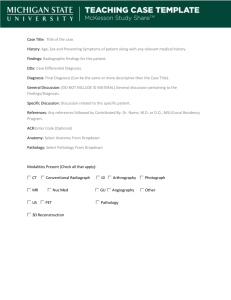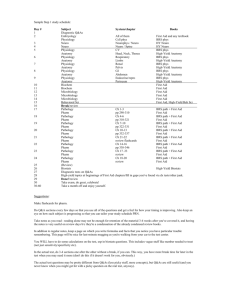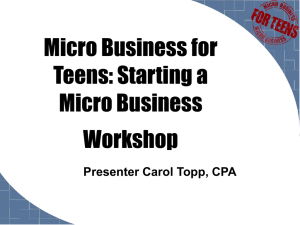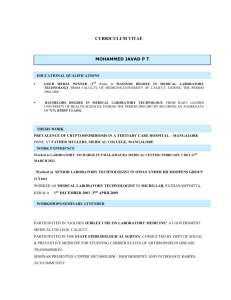Sunday
advertisement
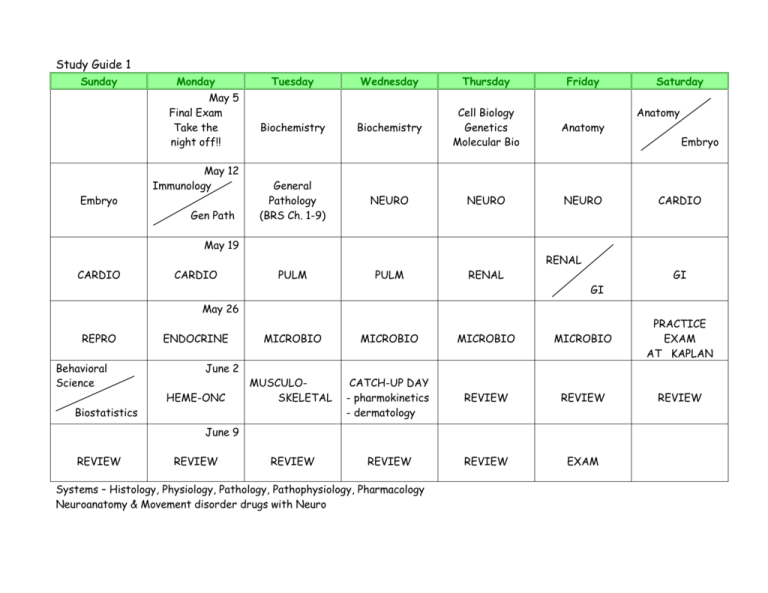
Study Guide 1 Sunday Monday May 5 Final Exam Take the night off!! Embryo May 12 Immunology Gen Path Tuesday Wednesday Thursday Friday Biochemistry Biochemistry Cell Biology Genetics Molecular Bio Anatomy General Pathology (BRS Ch. 1-9) NEURO NEURO NEURO PULM PULM RENAL May 19 CARDIO CARDIO RENAL GI May 26 REPRO Behavioral Science Biostatistics ENDOCRINE June 2 HEME-ONC REVIEW Anatomy Embryo CARDIO GI MICROBIO MICROBIO MICROBIO MICROBIO PRACTICE EXAM AT KAPLAN MUSCULOSKELETAL CATCH-UP DAY - pharmokinetics - dermatology REVIEW REVIEW REVIEW REVIEW REVIEW REVIEW EXAM June 9 REVIEW Saturday Systems – Histology, Physiology, Pathology, Pathophysiology, Pharmacology Neuroanatomy & Movement disorder drugs with Neuro BOOKS SUBJECT General Biochemistry Genetics Cell Bio / Molecular Bio Anatomy Embryology Immunology General Pathology Histology Physiology Pathology Pathophysiology Pharmacology Microbiology Behavioral Science Biostatistics BOOKS FIRST AID for the Boards Underground Clinical Vignettes (except Microbio) Kaplan Q-Bank Kaplan Q-Book High Yield Biochemistry, First Aid First Aid, High Yield Cell & Molecular Bio First Aid, High Yield Cell & Molecular Bio First Aid, High Yield Anatomy High Yield Embryology, First Aid High Yield Immunology, First Aid BRS Pathology Ch. 1-9, First Aid First Aid, On-line module (Mel’s) BRS Physiology, First Aid BRS Pathology, First Aid First Aid, Pathophysiology for the Boards & Wards* First Aid, Lippincott’s Pharmacology*, Pharm Recall* Microbiology Made Ridiculously Simple, First Aid High Yield Behavioral Science, First Aid High Yield Biostatistics, First Aid Study Guide 2 Sunday Monday May 5 Final Exam To Atlanta Tuesday Wednesday Thursday Friday Saturday X MEN II Biochemistry Biochemistry Biochemistry Weekend in Savannah MICROBIO MICROBIO PSYCH HEME-ONC CARDIO CARDIO/PULM PULM PULM Weekend in Savannah GI NEURO NEURO ENDO/RERPO ENDO/REPRO BIRTHDAY WEEKEND RHEUM/ANAT PRACTICE TESTS PRACTICE TESTS PRACTICE TESTS May 12 Weekend in Savannah MICROBIO WEEKEND OFF May 19 WEEKEND OFF CARDIO May 26 Weekend in Savannah GI June 2 BIRTHDAY WEEKEND RENAL RENAL/RHEUM June 9 PRACTICE TESTS PRACTICE TESTS PRACTICE TESTS PRACTICE TESTS EXAM AFTERNOON OFF BOOKS These hints are guaranteed to give you at least a 240 on the boards.* My hours were 9 a.m. to 5 p.m. I studied at the Emory Health Science Library. If you excluded time spent on e-mail, doing crossword puzzles, naps and eating lunch/snacks, I studied 5-6 hours a day (and that is generous). I shipped down to Atlanta all of my notes and slides/handouts from the first two years. This was an enormous waste of time and money. I never touched them. I used First Aid for Step I as my guide. If it was in there, I studied it. If it was not, I did not waste my time looking for more items to memorize. If a disease was mentioned in First Aid, I supplemented its brief description with info from BRS Pathology. If a bug was mentioned in First Aid, I supplemented its brief description with info from Microbio Made Ridiculously Simple. If a drug was mentioned in First Aid, and I was curious about mechanisms/side effects, I used Lippincott Pharmacology. I used a systems approach: Cardiology = embryology, anatomy, physiology, pathology, pharmacology of the heart. I used Kaplan Q Bank. I liked it. On practice test days, I did up to 200 questions a day. Read the answers, they are helpful. Don’t get caught up in the percent you get wrong. Know these things well: 1. The heart, especially physiology and pharmacology 2. Microbiology and antimicrobials. Yeah, even the obscure ones. 3. The brachial plexus and the presentations of damage to it. I did not study the lower extremities and did not suffer from it. Have a beer/wine/cordial from time to time. It won’t kill you or your score. Remember this is just an exam. Please don’t bring any notes to the test place. You will only drive yourself crazy. * Guarantee will not be honored Study Guide 3 Sunday Monday Tuesday May 5 Day Off Final Exam Still being a real X MEN II person Gen Path Thursday Friday Saturday Lightly read Micro Lightly read Micro Lightly read Micro Day Off May 12 So it begins… Gen Path Wednesday Day Off Still being a real person Embryo Anatomy Anatomy Cardio Cardio Renal Renal/GI GI Endo Endo/Repro Behav Sci Behav Sci Neuro Neuro Neuro May 19 Pulm Pulm May 26 Heme Heme/Derm June 2 Chill, Brah Biostats Biostats Micro Micro Micro Kaplan Exam Go out… First Aid First Aid First Aid First Aid First Aid Go to Boston Drink Drink Sleep June 9 Attempt Biochem, most of day off REVIEW First Aid “Catch up” on whateva June 16 Rapid review in First Aid Rest of day off for… Matrix II BOOM!!!!! Step 1 Relax after the exam… Drink General stuff: Went home to CT for exam…studied at Yale Library. Studied an average of ~ 6 hours/day Studied by organ system, which inc - Physio, Path, Pharm -- Pharm only out of First Aid Got LOTS of sleep (usually) - this was KEY Did 50 Qbank questions at end of each "system" - ended up being 2-3 times per week Basically did not study Histo,Cell Bio,Immuno except for what was in First Aid Did not study Biochem except for First Aid and diseases in BRS Path. Used Underground Clinical Vignettes for clarification - usually about 1-2 x per week Books - 1st Aid,Clin Micro,BRS Path&Physio,High Yield Anat&Embr&Neuro&Biostats&Behav Sci Study guide 4 Sunday Monday May 5 Final Exam Tuesday Day off, prepare books Finished one chapter May 12 Neuroanatomy Neuroanatomy Neuroanatomy Neuropath Neuropath Wednesday Thursday Friday Saturday Biochemistry Biochemistry Biochemistry Neuroanatomy Micro Micro/Anatomy Micro/Anatomy Immunology May 19 Behav Sci Behav Sci Behav Sci/ Statistics Gen Path Gen Path Gen Path Embryo/ Pulm Pulm PULM GI PULM GI GI/Renal Renal/Repro Repro Repro Endocr Endocr Rheum/Skel Blood Blood REVIEW REVIEW REVIEW EXAM (Deferred) May 26 Embryo/ Cardio Cardio Renal Renal Embryo/ Cardio June 2 June 9 Endocr/Rheum Rheum June 16 REVIEW REVIEW REVIEW REVIEW REVIEW Books -First Aid (2003 edition) -microbio made ridiculously simple -BRS pathology -BRS physiology -Pathophysiology for the Boards and Wards -HY Biochemistry -Lippincott Biochemistry -HY immunology -HY histology -HY anatomy -HY embryology -HY neuroanatomy -HY molecular biology and genetics -HY behavioral science -Pharmacology for the Boards and Wards -Qbook Computer aids: -Qbank (3 months) -NBME free 150 practice Q's Study Guide 5 Schedule I didn’t make one. Throughout medical school I was never able to artificially restrict my study time, and I saw no reason to change my habits at the last minute. This can have advantages and disadvantages. If you’re the type of person who requires structure and needs to plan ahead right up until the exam, go for it. On the other hand, if you don’t like to be boxed in by timetables and prefers the freedom to improvise on a daily basis, scheduling might not be for you. Also, you won’t feel guilty when the circulatory system takes you six days to cover instead of the four that you had budgeted. Fair warning: this requires a high level of motivation, as you’ll start every day wondering “What do I start with?” What I did do prior to beginning my study period was to take a Q bank mini-diagnostic exam. Kaplan is useful for identifying your weak spots; unsurprisingly, mine were anatomy and physiology (I hated the anatomy lab right up until we hit the brain). Early on during my study days I spend the majority of my morning covering these two subjects, mixing it up with path and gradually introducing others. I’d recommend starting anatomy and pathology early on, as the sheer volume of material to be covered can be daunting. More specifically, I used a vaguely system-based approach to my study, trying to stay high-yield and going off on tangents frequently. For example, I’d begin with the liver. I’d spend a little time reviewing the histology (cells of Ito, space of Disse) and the anatomy (hepatoduodenal ligament contains the portal triad). Then I’d review some pathology, focusing on genetic diseases that can cause hepatitis (Wilson’s, hemochromatosis); the mention of drug-induced hepatitis would make me spend some time reviewing anti-TB medications, which would cause me to shift to TB for a bit, and then I’d review other Mycobacterial infections . . . Like I said, not for everybody. It worked well for me. Materials First Aid is crucial; one good piece of advice the fourth-years gave us is to take all your notes within its relevant section when you’re studying. This makes sure you don’t have to reference back and forth as you flip through it for the fifteenth time. The other two books I would strongly recommend getting are BRS Path (all of you should be familiar with this one) and Clinical Microbiology made Ridiculously Simple. Clinical micro teaches you almost every bug you’ll need to know, and also covers almost all the antibiotics and their side effects. BRS Path should be falling apart by the time you’re done; pathology is huge on the boards and you need to know pretty much all of it. I’ll cover other study aids by category below. One more thing: First Aid is good and high-yield, but do not depend on it as your sole source of info for any subject. It’s too general and the boards no longer focuses on “buzzwords” as much. You need to have a more detailed knowledge on most subjects. I used Kaplan’s QBank to quiz myself; this was the only thing I did consistently (around 50-100 questions/night). The questions are accurate but a bit harder and more detail-oriented than what you’ll see on the boards. Try to quiz yourself with a mixed bag; I focused early on biochemistry and ended up using all my biochem questions. Something else which I signed up for and found very useful were Kaplan’s Integrated Vignettes---the questions were much more multidisciplinary and actually taught me a lot. I didn’t use QBook or any of the other written materials. In addition to First Aid, I started keeping a scratch pad of odds and ends, so when I got a question wrong on Kaplan I ended up copying down the explanations they give for every choice. Other books: Anatomy: High-yield Anatomy is good. Focus on trauma-related injuries, and they love to ask questions related to the brachial plexus (I must have gotten seven). Know the innervation of the upper limbs cold. The Underground Clinical Vignette (UCV) series is an excellent aid for this subject. Don’t use Gray’s as anything outside of a BRIEF reference. Other good areas to spend some time on are the vasculature of the stomach and hernias. Neuroanatomy: I used BRS Neuroanatomy; unless you’re really interested in the field, don’t do this. It’s way too detailed. Highyield is the way to go. Be able to identify and differentiate hematomas on CT scan, and know the syndromes associated with common cerebrovascular infarcts (i.e. Wallenburg’s=PICA). Also, be aware that diseases of other organ systems can present neurologically (polycystic kidney disease). Biochemistry: No real good primary sources. I ended using a combination of First Aid and the UCV series. Lippincott’s can be used to shore up weak areas. Know the missing enzymes and toxic metabolites of ‘big name’ genetic diseases (Tay-Sachs, ICD) as well as their characteristic pathology. Behavioral Science/Biostatistics: The high yield books are all you need. Spend more than a day on both these subjects and you’re spinning your wheels. Histology: Any decent atlas will do; I used Wheaters. When you’re asked to identify a slide, the pathology will be 1. extremely noticeable and 2. pathognomonic for the disease in question (i.e., Hodgkin’s cells). Microbiology: Clinical micro, as above. As far as I can tell, this is the 2nd most heavily tested area on the boards. Once you’ve read the book from cover to cover (twice) the UCV series might come in handy as reinforcement. It’s very important to know which strains of bacteria are more likely to affect certain age groups (causes of meningitis in neonates vs. adults, causes of pneumonia in the elderly vs. everyone else). Try to know a great deal about iatrogenic bugs (Pseudomonas, C. diff) and their treatment. Pathology: BRS Path is golden. Study, well, everything. Stay away from buzzwords (‘café-au-lait spots’ for NF) as they won’t use those exact words in the vignette; instead, they’ll describe the physical findings and leave it to you to figure out. Really rare diseases will be on the exam (but not in the majority); I got a question on ataxia-telangectasia. Start early. Physiology: BRS Physio is excellent, and I wish I’d discovered this earlier. They’re fond of CHF-related vignettes and Starling curves. A solid grasp of endocrine is also good, as they love questions relating to Cushing’s disease (understand the dexamethasone suppression test) and the many abnormalities of sex hormones. Be able to perform thumbnail calculations relating to renal function (GFR, etc. You don’t need a calculator). First Aid is surprisingly high-yield for this. Pharmacology: Aside from clinical micro, there aren’t a lot of good sources. You might want to consider making a set of pharm cards, or buying one. This is a pure memorization field, so your mileage may vary. First Aid has a good section. Adverse drug effects are key (especially drugs that can mimic disease processes or cause liver/kidney dysfunction). Also, drug-drug interactions (which drugs speed up/slow down the p450 system?) Odds and ends Change up your study spots frequently to avoid cabin fever. Don’t stop exercising; it’s a great way to blow off steam and keep your energy levels up. You don’t have to study in a group for the whole period, but getting together occasionally and quizzing each other with vignettes is a good way to keep knowledge fresh. Avoid people who freak you out, but don’t become a hermit. Stay in touch with friends, go out for a beer once in a while. Try not to push the exam date back outside of emergencies. The extra time you gain isn’t worth the anxiety it causes, and you’re more likely to do it again. Remember: all of you will pass, most will do very well. It’s like The Hitchhiker’s Guide to the Galaxy says. . . DON’T PANIC. Study Guide 6 Sun Mon Tues Wed --Joe’s Schedule 4 11 NEURO 5 12 NEURO Thurs Fri Sat 1 2 3 10 Pharm Kinetics Cell Bio 6 7 8 9 BIOCHEM BIOCHEM BIOCHEM BIOCHEM 13 GENERAL PATH 14 15 16 CARDIO CARDIO PULMONARY 18 19 20 21 22 23 RENAL RENAL GI GI REPRO ENDOCRINE 25 anatomy/embryo 26 limb anatomy 27 Musculoskeletal 28 cell bio/immunology 29 Micro 30 Micro 3 Behav Sci/ Biostats 4 Review (anatomy/embryo qbank) 11 TEST DAY! 5 6 Review Review (behavioral/biochem/ (micro/qbank) qbank/pharm) 1 Catch-up 2 2 (micro/cell Derm bio/immuno/PHARM) Heme-onc 8 Review (path/ qbank) 9 Review (pharm/physio/ qbank) 10 Review (q bank/ end early and do nothing) ** Everday – QBANK QUESTIONS and some Pharmacology; UCV cases in small group every few days 17 PULMONARY RENAL 24 catch-up day (PHARM stuff/ some physiology) 31 Micro 7 Review (path/ qbank)
